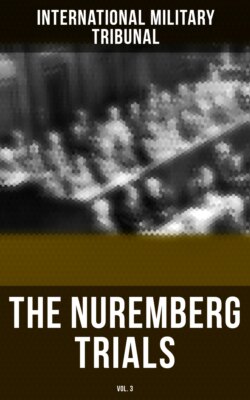Читать книгу The Nuremberg Trials (Vol.3) - International Military Tribunal - Страница 17
На сайте Литреса книга снята с продажи.
[A recess was taken.]
ОглавлениеMR. ALDERMAN: May it please the Tribunal, General Jodl’s diary again gives a further insight into the position of the Henlein Free Corps. At this time, the Free Corps was engaged in active skirmishing along the Czech border, furnishing incidents and provocation in the desired manner. I quote from the entries in the Jodl diary, for the 19th and 20th September 1938, at Page 6 of the Document 1780-PS, which is Exhibit USA-72.
“19 September: Order is given to the Army High Command to take care of the Sudeten German Free Corps.
“20 September: England and France have handed over their demands in Prague, the contents of which are still unknown. The activities of the Free Corps start assuming such an extent that they may bring about, and already have brought about, consequences harmful to the plans of the Army. (Transferring rather strong units of the Czech Army to the proximity of the border.) By checking with Lieutenant Colonel Köchling, I attempt to lead these activities into normal channels.
“Toward the evening the Führer also takes a hand and gives permission to act only with groups up to 12 men each, after the approval of the corps headquarters.”
A report from Henlein’s staff, which was found in Hitler’s headquarters, boasted of the offensive operations of the Free Corps. It is Item 30 of the Schmundt file, Page 54 of Document 388-PS. I read the last two paragraphs:
“Since 19 September, in more than 300 missions, the Free Corps has executed its task with an amazing spirit of attack,”—now, that word “attack” was changed by superimposition to “defense”—“and with a willingness often reaching a degree of unqualified self-sacrifice. The result of the first phase of its activities: More than 1500 prisoners, 25 MG’s”—which I suppose means machine guns—“and a large amount of other weapons and equipment, aside from serious losses in dead and wounded suffered by the enemy.”—And there was superimposed in place of “enemy”, “the Czech terrorists.”
In his headquarters in the castle at Donndorf, Henlein was in close touch with Admiral Canaris of the Intelligence Division of the OKW and with the SS and the SA. The liaison officer between the SS and Henlein was Oberführer Gottlob Berger (SS).
I now offer in evidence Document 3036-PS as Exhibit USA-102, which is an affidavit executed by Gottlob Berger; and in connection with that affidavit, I wish to submit to the Tribunal that it presents, we think, quite a different question of proof from the Schuschnigg affidavits which were not admitted in evidence by the Court. Schuschnigg, of course, was a neutral and non-Nazi Austrian. He was not a member of this conspiracy, and I can well understand that the Court rejected his affidavit for these reasons.
This man was a Nazi. He was serving in this conspiracy. He has made this affidavit. We think the affidavit has probative value and should be admitted by the Tribunal under the pertinent provision of the Charter, which says that you will accept in evidence any evidence having probative value. We think it would be unfair to require us to bring here as a witness a man who would certainly be a hostile witness, who is to us a member of this conspiracy, and it seems to us that the affidavit should be admitted with leave to the defendants, if they wish, to call the author of the affidavit as their witness. I should have added that this man was a prominent member of the SS which is charged before you as being a criminal organization, and we think the document is perfectly competent in evidence as an admission against interest by a prominent member of the SS organization.
DR. STAHMER: Mr. President, the Defense objects to the use of this document. This document was drawn up as late as 22 November 1945, here in Nuremberg, and the witness Berger could, therefore, be brought to Court without any difficulty. We must insist that he be heard here on the subjects on which the Prosecution wishes to introduce his testimony. That would be the only way in which the Defense could have an opportunity of cross-examining the witness and thereby contribute to obtaining objective truth.
